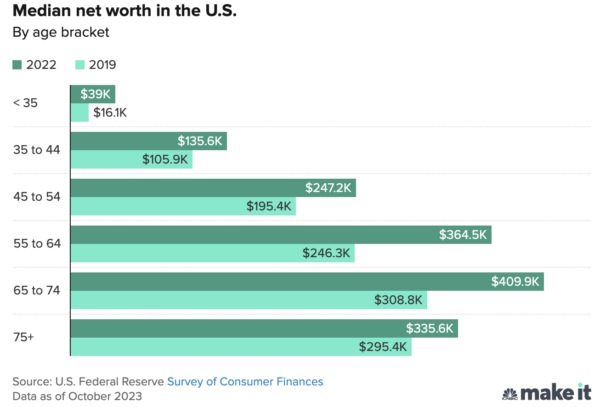
This Chart Changes My View On Everything

The Bubble That No One Sees Coming
Picture this: the stock market on a roller coaster ride, only it’s defying gravity. For now. GDP numbers are skyrocketing, and the net worth of Americans—especially those under 35—is ballooning at an unprecedented rate. But wait, what if this thrill ride is building up to a dizzying height only to drop us into economic chaos?
Don’t let the numbers lull you into a false sense of security. The economy is balancing precariously on the edge of a knife—a knife that’s getting sharper by the day. Let’s unravel this paradox, connecting the dots between soaring net worths, asset dependency, and the lurking dangers that could bring it all crashing down.
The Mirage of Exploding Net Worth
According to recent data, the net worth of Americans under 35 has surged by 142% since 2019. Yes, you read that correctly. So what’s fueling this apparent prosperity? Higher nominal wages? Check. Deferred student loans and mortgages? Check. But are these young Americans dancing on the deck of the Titanic?
While the figure might make you feel like you’ve won the lottery, it’s essential to consider what’s behind this surge. Could it be that we’re mistaking a bubble for genuine prosperity?
The Emotional Fallout
What happens when your net worth jumps from $16,000 to $39,000? You feel invincible. You’re more likely to spend, encouraged by a psychological boost that makes you think you’re on the path to becoming a millionaire. But what if this is a house of cards waiting to collapse?


The Asset Dependency Quagmire
Hold on a second. Do these numbers tell the full story? In an economy increasingly dependent on asset prices, the rising net worth may be a siren song luring us toward rocky shores. Remember that right now the financial economy is leading the real economy. Like the hot air ballon analogy.

A Global Perspective
Let’s broaden our view. Globally, many cities are experiencing a real estate bubble, and when adjusted for inflation, prices are plummeting. Stockholm’s housing prices, for example, are down a staggering 22% in just a year. Is the U.S. heading toward the same fate?

The Fed’s Illusion of Control
So the Fed will save us, right? Think again. The Fed’s power is largely monetary. Remember the 2008 Global Financial Crisis? Despite the Fed’s interventions, housing prices kept falling until 2012. So, who’s to say they can control the situation this time?
The Implications and the Unthinkable
Recession Timeline
If the net worth bubble doesn’t burst, does that mean we’re dodging a recession? Maybe, but it’s crucial to reevaluate this rosy view. The yield curve inversion usually takes 18 to 24 months to lead to a recession. Given the current trends, we might be looking at a longer timeline, perhaps even into 2024.
Inflation’s New Trajectory
The other issue? Inflation could stay higher for longer. If net worths continue to rise, even in the face of asset devaluation, inflation may remain elevated, potentially reaching up to 4.5%.
The Roller Coaster No One Wants to Ride
We’re living in a world where net worths are soaring and asset prices are climbing—until they aren’t. The economy may seem robust, but it’s increasingly dependent on factors that are as volatile as they are unsustainable.
Is this a bubble? Maybe. Is it dangerous? Absolutely. When the roller coaster of asset prices and inflated net worths starts its descent, hang on tight—it’s going to be a stomach-churning drop into economic reality.
